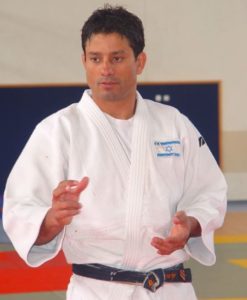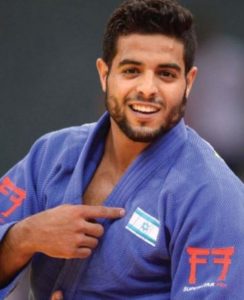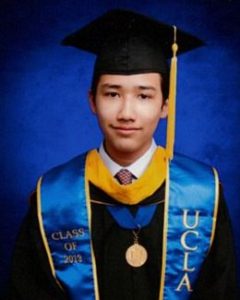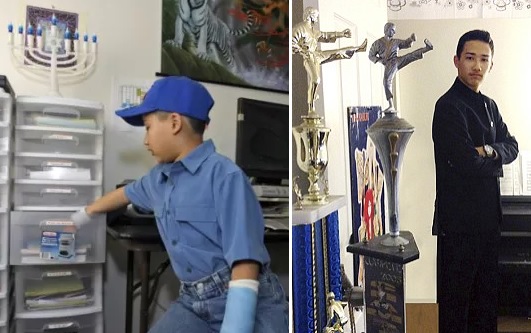Judo World Champion

Oren Smadja
Shay Oren Smadja (b. 1970) was born to a Tunisian-Jewish family in Ofakim, Israel. He was the son of Israel’s first judo coach, Morris Smadja, who played a key role in introducing the sport to Israel. Trained by his father, Oren Smadja won his first gold medal in judo at the age of 12. Seven years later, he was Israel’s judo champion. Smadja went on to represent Israel at the 1992 Barcelona Olympics where he won a bronze medal. Three years later, he won the silver medal at the 1995 World Judo Championships. In 2008 he was a participant in the Israeli TV version of “Dancing With the Stars”. Altogether, Smadja won a medal or championship in 14 professional tournaments. He retired after competing in the 1996 Atlanta Olympics, and turned to coaching judo full time.

Sagi Muki
One of Smadja’s first students was a four-year old Sagi Aharon Muki (b. 1992) from Netanya, Israel. At the young age of 8 he had to choose to pursue either soccer or judo, and went with the latter. Under Smadja’s tutelage, Muki went on to win the under-20 European Cup in Berlin in 2011. The following year, he was Israel’s judo champion in his weight class, a feat that he repeated in 2013. He continued to win in multiple international competitions, and was ranked second in the world by 2015. That year, he took gold at the European Games and the European Judo Championship. Muki represented Israel at the 2016 Rio Olympics. Unfortunately, he failed to win a medal after severely injuring his spine. Bedridden for months, it seemed that Muki’s career was over. Undeterred, he refused surgeries and instituted an intense healing and training regime. Muki got back into shape and returned to judo at the Grand Prix Tashkent in October 2017. Silencing all of his critics, Muki won gold. Half a year later, he took another gold in the European Championships. Earlier this year, Muki climbed back to the world number 2 spot. Last week he won gold at the 2019 World Judo Championships in Tokyo, making him the first Israeli world champion. Muki also served in the IDF and carries the rank of sergeant. He takes great pride in representing Israel around the world, and is expected to bring home another gold at next year’s Summer Olympics in Tokyo.
How Many Soulmates Do You Have?
21 Facts About Kosher Every Jew Should Know
Words of the Week
Who can challenge the rights of the Jews in Palestine? Good Lord, historically it is really your country.
– Yusuf Diya al-Khalidi, Ottoman politician and Muslim scholar (1899)

 Moshe Kai Cavalin (b. 1998) was born in Los Angeles, the son of a Taiwanese mother and an Israeli-Brazilian father. He started speaking at 4 months of age, and was reading and doing math by 3. At 6, he was rejected from elementary school because he “knew more than the teacher”, and had to be home-schooled. At 8, he became the youngest person in American history to take college classes. He got his first degree three years later, with a perfect 4.0 GPA. He then enrolled at UCLA – with a full scholarship – and earned a BS in mathematics. Meanwhile, Kai wrote two bestselling books (an inspirational autobiography, and a manual to deal with bullying). For fun, he scuba dives, plays piano, and chess, and avoids video games which, he says, are “not helping humanity in any way.” He is also an avid martial artist – thanks to his father, a former IDF special forces commando – and has won 26 gold medals. Incredibly, Kai got a pilot’s license, too. This led to a phone call from NASA in 2015. NASA needed a pilot who also knew math, physics, and computer programming to develop surveillance and anti-collision technology for drones and airplanes. Kai has been at NASA ever since, working hard to keep the skies safe. He is concurrently doing his Master’s in cybersecurity, and intends to later get a Master’s in business from MIT before opening his own cybersecurity company. Kai describes himself as a religious person and often credits God with giving him the insight to solve problems. One of his professors once said: “I think most people just think he’s a genius, they believe it just comes naturally… He actually worked harder than, I think, any other student I’ve ever had.”
Moshe Kai Cavalin (b. 1998) was born in Los Angeles, the son of a Taiwanese mother and an Israeli-Brazilian father. He started speaking at 4 months of age, and was reading and doing math by 3. At 6, he was rejected from elementary school because he “knew more than the teacher”, and had to be home-schooled. At 8, he became the youngest person in American history to take college classes. He got his first degree three years later, with a perfect 4.0 GPA. He then enrolled at UCLA – with a full scholarship – and earned a BS in mathematics. Meanwhile, Kai wrote two bestselling books (an inspirational autobiography, and a manual to deal with bullying). For fun, he scuba dives, plays piano, and chess, and avoids video games which, he says, are “not helping humanity in any way.” He is also an avid martial artist – thanks to his father, a former IDF special forces commando – and has won 26 gold medals. Incredibly, Kai got a pilot’s license, too. This led to a phone call from NASA in 2015. NASA needed a pilot who also knew math, physics, and computer programming to develop surveillance and anti-collision technology for drones and airplanes. Kai has been at NASA ever since, working hard to keep the skies safe. He is concurrently doing his Master’s in cybersecurity, and intends to later get a Master’s in business from MIT before opening his own cybersecurity company. Kai describes himself as a religious person and often credits God with giving him the insight to solve problems. One of his professors once said: “I think most people just think he’s a genius, they believe it just comes naturally… He actually worked harder than, I think, any other student I’ve ever had.”

